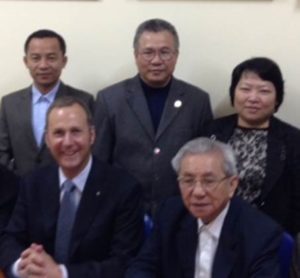
Vietnam is joining other developing nations in building primary health care through family medicine to provide solutions to major health care challenges.
Professor Michael Kidd, Executive Dean of the Faculty of Medicine, Nursing and Health Sciences at Flinders, says Vietnam’s family doctor model is being supported by the World Bank to strengthen primary health care and ensure universal health coverage.
Professor Kidd visited Vietnam this month as President of the World Organisation of Family Doctors (WONCA).
“Vietnam is ahead of many comparable countries, given that family medicine has been a recognised medical specialty in Vietnam since 1998,” Professor Kidd says.
“I was told there are now 800 postgraduate specialists in family medicine working in clinics across the country.
“Family medicine development is a top priority for the Government of Vietnam, as evidenced in my meeting with the Minister for Health.”
Professor Michael Kidd met the Health Minister Nguyen Thi Kim Tien to discuss the potential for its pilot family doctor model.
Over the next 10 years, Vietnam will continue working to expand the family doctor model integrated with community health care and the health insurance system.
“We hope to cooperate in training family doctors as well as developing a family doctor model that fits the situation in Vietnam,” Professor Kidd says. “This is an exciting time for health care reform in Vietnam.
“I was very impressed with all that I saw, especially the passion and commitment of the family medicine leaders in the clinics, in the medical schools and in the government, and the fruitful and long-standing partnerships with family medicine colleagues from the USA and Belgium and other parts of the world.”
Vietnam is the 13th most populous country in the world, with more than 70% or its 90 million people living in rural areas.
Professor Kidd says WONCA can contribute to family medicine development in many ways, “through our publications and resources, through our standards, and especially through our member organisations and the many thousands of family doctors around the world who are willing to volunteer their time to support our colleagues in other nations in their work to deliver high quality primary care to all people”.

